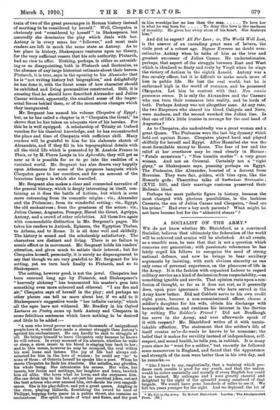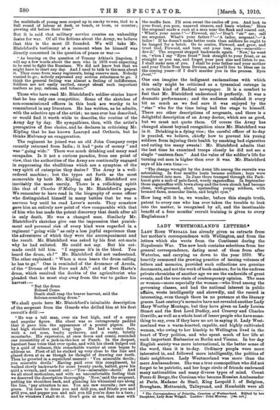A SOCIALIST ON THE ARMY.* WE do not know whether
Mr. Blatchford, as a convinced Socialist, believes that ultimately the federation of the world will be achieved and armies will be abolished. At all events, as a sensible man, he sees that that is not a question which concerns our generation ; with passionate vehemence he has lately urged his fellows to recognise the need of strong national defence, and now he brings to bear auxiliary arguments by insisting, with such obvious sincerity as can only come of personal experience, on the pleasures of life in the Army. It is the fashion with organised Labour to regard military service as a kind of declension from respectability,—as something ignoble and servile. That opinion rests upon a con- fusion of thought, so far as it does not rest, as it generally does, upon pure ignorance. Those who have served in the Army know better. Did not Cobbett serve to his own credit eight years, become a non-commissioned officer, choose a soldier's daughter for his wife, obtain his discharge with honourable notice, and continue his interest in the Service by writing The Soldier's Friend ? Did not Bradlaugh too serve in the Army, and ever afterwards speak of it with respect? Mr. Blatchford writes of it with unmis- takable affection. The statement that the soldier's life of itself creates ne'er-do-weels he knows to be nonsense; the
belief that it makes for servility instead of independence, self- respect, and sound health, he tells you, is rubbish. It is many years since he "went for a soldier," but recently he followed some manoeuvres in England, and found that the appearance and strength of the men were better than in. his own day, and he remarks :— "Also I have to say, emphatically, that a training which pro- duces such results is good for any youth, and that the nation would be richer materially and morally if every English boy could be so trained. My colleague and I were greatly cheered and delighted by the sight of the splendid young manhood of that brigade. We would have gone hundreds of miles to see it. We felt ten years younger for the sight. And we deplored the lot of • My Life in the Army. By Robert Bistebford. London ; The Amalgamated Press. [6d.]
the multitude of young men cooped up in smoky towns, tied to a lull round of labour at desk, or bench, or loom, or counter; growing old before their time."
But it is said that military service creates an unhealthy desire for war. Of all the fictions about the Army, we believe that this is the most ill founded. We will take Mr. Blatchford's testimony at a moment when he himself was directly concerned in the question of peace or war :— " As bearing on the question of Tommy Atkins's jingoism, I will say a few words about the men who in 1878 were expecting to be sent to fight the Russians. We did not know but that we might have to start any day. And I used to talk to the men about it. They came from many regiments, being reserve men. Nobody wanted to go ; nobody expressed any serious reluctance to go. I think the general feeling was almost a feeling of indifference. Soldiers are not easily excited, except about such important matters as pay, rations, and tobacco."
Those who have read Mr. Blatchford's soldier-stories know that he has only one competitor. Some of the sketches of non-commissioned officers in this book are worthy to be remembered in any literature. He has written, as he admits, with the selective eye of the artist; no man ever has described, or would find it worth while to describe, the routine of the
Army day by day. He sympathises, then, with the artist's prerogative of free choice, and he declares in criticising Mr. Kipling that he has known Learoyd and Ortheris, but he thinks Mulvaney an exaggeration.
The regiment he joined was an old John Company corps recently returned from India ; it had " pots of money " and was " going wide." There was much drinking and many mad escapades. Is it not a curious paradox, from one point of view, that the authorities of the Army are continually engaged in suppressing the ebullitions which are a symptom of the
very spirit of enterprise they desire P The Army is a well-
ordered machine ; but the types set forth as the most memorable by both Mr. Kipling and Mr. Blatchford are
inevitably the most unruly. There is a rollicking spirit like that of Charles O'Malley in Mr. Blatchford's pages. We remember to have read in the biography of some officer
who distinguished himself in many battles that he was a nervous boy until he read Lever's novels. They somehow gave him an entirely new point of view comparable with that of him who has made the potent discovery that death after all is only death. He was a changed man. Similarly Mr. Blatchford's sketches give one the impression that punish- ment and personal risk of every kind were regarded in a
regiment "going wide " as only a less joyful experience than the adventures of which they were the accompaniment and the result. Mr. Blatchford was asked by his first cot-mate why he had enlisted. He could not say. But his cot- made could tell him. " I suppose it's in the blood. You
heard the drum, eh ? " Mr. Blatchford did not understand. The other explained : " When a man hears the drum calling he has to go." One is reminded of the drummer of Arcola, of the " Drums of the Fore and Aft," and of Bret Harte's dram, which resolved the doubts of the agriculturist who pleaded that he must stay away from the war to gather his
harvest:—
"But the drum Echoed Come.
Death shall reap the braver harvest, said the Solemn-sounding drum."
We shall quote here Mr. Blatch ford's inimitable description of the sergeant from the Guards who drilled him at his first recruit's drill :—
"He was a tall man, over six feet high, and of a spare and angular figure. His chest was so outrageously padded that it gave him the appearance of a pouter pigeon. He had high shoulders and long legs. He had a comic face, with a red nose, bushy eyebrows, and a rusty, bristly moustache. His expression, at once fierce and comic, reminded one irresistibly of a jack-in-the-box or Punch. In the deepest, harshest bass voice that ever spoke, and with his cheek bulged out by a quid of tobacco, this remarkable warrior at once began to address us. First of all he stalked up very close to the line and glared down at us as though he thought of drawing our teeth. Then he growled in a sepulchral manner : You miserable devils; you miserable devils.' Having paid over this compliment, he walked slowly backwards for some twenty yards, halted, gave his quid a wrench, and roared out :=You—miserable—c/evils.' And we all stood motionless, and with an uncomfortable feeling that we deserved the description thoroughly. `Now,' said the sergeant, putting his shoulders back, and glancing his whimsical eye along the line, pay attention to me. You are raw recruits ; raw and green. I'm here to dress you and drill you, and frizzle you and grill you, and pepper you and salt you till you're done to a turn ; and by whiskers I shall do it. Don't grin at me, that man with
the muffin face. I'll soon sweat the smiles of you. And look to your front, you poor, unsaved sinners, and learn wisdom.' Here the sergeant made a rush at a man near the flank and roared out, ' What's your name ?'—' Firwood, sir.'—' Don't "sir" me ; call me sergeant. What's your father ? A tailor, sergeant.'—' A. tailor ! If he doesn't make better coats than soldiers he ought to be hanged for a botch. Go to centre, Firwood, and grow, and trust God, Firwood, and turn out your toes, you--miserable- dev-il! The sergeant stepped backwards again. ' Now,' he went on, 'when I say "Eyes front" look straight to your front, or as straight as you can, and forget your past sins and listen to me. I shall make men of you. I shall be your father and your mother and your Uncle Tom from Devizes, and you'll live to bless me in the coming years—if I don't murder you in the process. Eyes front.'"
One can imagine the indignant exclamations with which this sally might be criticised as a tyrannical outrage in a certain kind of Radical newspaper. It is a comfort to feel that Mr. Blatchford understood it perfectly. It was a dramatic performance ; and the audience relished it every bit as much as we feel sure it was enjoyed by the "star" who for the time being had the stage to himself. There are other descriptions of sergeants, and there is a delightful description of an Army doctor, which are as good, but we must not quote them. Of course the Army has changed almost beyond recognition since Mr. Blatchford was in it. Drinking is a dying vice ; the careful officer of to-day is puzzled, we believe, chiefly how to prevent his young soldiers from injuring their health by smoking bad cigarettes and eating too many sweets ! Mr. Blatchford admits that the last time he examined troops closely he did not see a single "canteen-face." And the value of the soldier's life for turning out men is higher than ever it was. Mr. Blatchford says of his own time :—
" The change wrought by the Army life among the recruits was astonishing. In four months louts became soldiers ; boys were transformed into men. In June there tramped through the Park- hurst gate a mob of pale-faced, weedy ragamuffins. In September those ragamuffins with town stoop and the town slouch had become clean, well-groomed, alert, upstanding young soldiers, with bronzed faces, muscular limbs, and bright eyes."
How long will it be, we wonder, before this simple truth, patent to every one who has ever taken the trouble to look into the matter, is recognised by all, and the inestimable benefit of a four months' recruit training is given to every Englishman ?















































 Previous page
Previous page